|
I don't have kids. I've never wanted any and genuinely can't imagine what it's like to be a parent. It's an abstract concept for me, in part because I give it so little thought, and when some says something like, "Imagine if it was your child," in response to a newsworthy situation involving an infant or adolescent, I just can't. Then again, I don't even try that hard. That doesn't mean I'm lacking in empathy. No, I've got empathy coming out of my ears. As a result, if I witness a child having a public argument with one of its parents, I do feel as much for the adult of this difficult child as I do for the child of this overbearing adult, though I'm usually too busy offering thanks to the Lords of Fate that I'm able to simply walk away from this without getting involved. That said, I did have a childhood and have thus seen it from one side, and frankly I wouldn't wish the younger me on anyone, let alone my own beloved mother and father.
It's because of all this that I couldn't say just how protective I would be of a product of my seed, how much freedom I might give it or how many restrictions I might impose on its behaviour. As a child, I was cut the sort of slack that would probably be considered dangerous now but which back then was not in any way unusual. Whether it was less precarious then or we were less aware of the risks is a topic for another day. This freedom allowed me to get into all kinds of trouble – for which I was repeatedly and mercilessly punished – but also to discover many things on my own terms and, eventually, grow as my own person instead of one that my parents might have wanted me to be. All they really wanted was for me to be happy, and I'm not sure anyone can tell you how to do that, as it's something you need to discover for yourself through a sometimes painful but often rewarding process of trial and error.
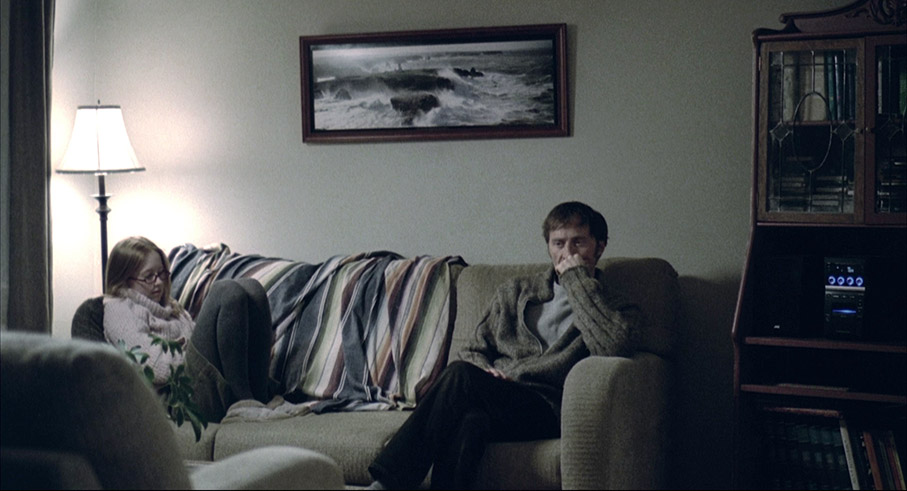
Perhaps because of the slack I was cut, for better or worse, I do tend to twitch when I read stories about parents who are so over-protective that they try to control every aspect of their child's behaviour, which at its most extreme can result in the child being effectively kept prisoner in the family home. It's a situation that has proved a ripe kicking-off point for some notable films, from Rolf de Heer's controversial Bad Boy Bubby (1993) to Yorgos Lanthimos' Dogtooth (2009), Samira Makhmalbaf's debut feature The Apple (1998), and Crystal Moselle's The Wolfpack, which documented the case of six brothers who had spent their whole lives cooped up in their New York apartment and whose knowledge of the world was gleaned entirely from movies.
The situation at the heart of Denis Côté's 2010 Curling might not initially seem to be quite so extreme, but it certainly leans in that direction. Jean-François Sauvageau is a single father who works behind the scenes at a bowling alley and part-times as a cleaner at a local motel and who lives with his 12-year-old daughter Julyvonne in a remotely located house in midwinter Quebec. It quickly emerges that Jean-François has an over-protective attitude to Julyvonne's upbringing, keeping her out of school and forbidding her to leave the house unaccompanied, especially at night. Both seem set in ways dictated by Jean-François, but this forced isolation is set to impact on how they respond to dark discoveries they independently make and which they elect not to reveal to each other.
I suspect that Curling is a film that will be judged by some solely on the unhurried calm of its surface alone as a film in which not that much happens and potentially dramatic story threads are left frustratingly unexplored. I do get that, but would suggest that there is so much going on here that is not overtly stated or is repurposed from standard movie tropes that the rewards for the patient and observant viewer are present in abundance. Back when I reviewed Kitano Takeshi's Violent Cop, I confessed that I'm a bit of a sucker for films that break with convention and open on a facial close-up of a character we've yet to get to know. Here the face in question belongs to Julyvonne, whom we quickly discover is at the diagnostic stage of an appointment with an optician whose voice we hear but whose face we never see (the exact same approach taken by Joel Potrykus four years later for the first post-title shot of Buzzard). The camera stays on her for a two full minutes, only widening at one point to include her father when the optician asks that he step in so he can explain his diagnosis and question his daughter's claim that she doesn't attend school. The enquiry prompts Jean-François to shift his eyes uncomfortably, but it's telling that his eventual response is not to confirm or deny the claim but state politely but brusquely, "That's our business, sir."
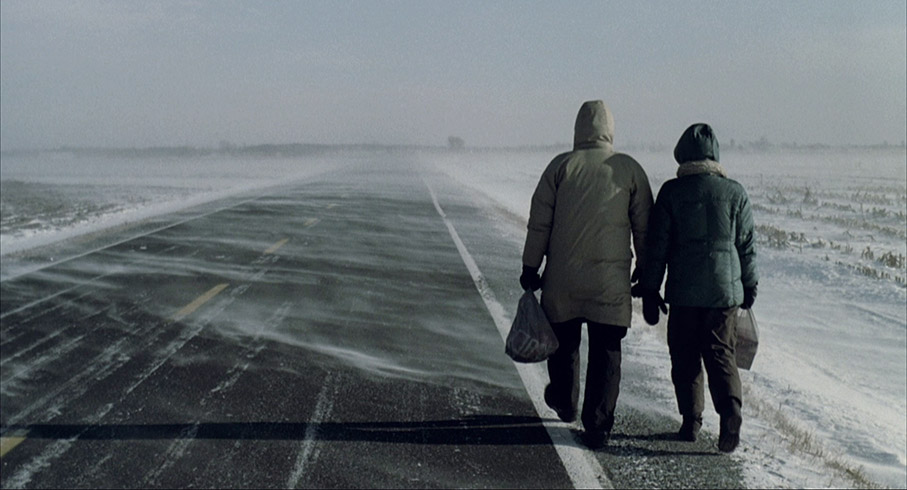
After the calm of this opening, the second shot lands with a considerable wallop, as Jean-François and Julyvonne trudge down a road with barren borders and a distant vanishing point and dustings of snow are blown across it with a force that actually made me shiver with cold, while the camera that follows them seems to be fighting with the wind to keep up. If you want to get an image of it, try to imagine Fargo directed by Béla Tarr. As they walk, a police car pulls up and a patrolman steps out to ask where Jean-François and Julyvonne are heading, if Julyvonne is Jean-Fançois' daughter and whether they live nearby, seemingly not because of anything suspicious they have done but because no-one with any sense would choose to walk this road in this weather at this time of year. Again Jean-François is defensive in his answers – "That's our problem, not yours" – and when the policeman offers to give them a lift, he declines. Even at this early stage with little else to go on, it seems evident that it's not so much that Jean-François doesn't like cops, but that he prefers not to engage with anyone who might disrupt his life or ask questions about the way he has chosen to bring up his daughter.
The fact that Jean-François and Julyvonne live a largely solitary existence is confirmed by the quiet montage of housework and dismantling of Christmas decorations that follows, which dovetails almost invisibly into a sequence showing Jean-François at work in the bowling alley being cheerfully chided by his slightly creepy and tackily dressed employer, Kennedy. Through him and specifically his conversations with his employee we learn a little more about Jean-François – whom Kennedy calls, a tad derisively, "moustache" – and Julyvonne, though again elements are teasingly left open to speculation. A casual conversation between the two men, for instance, reveals that Jean-François used to bring Julyvonne bowling and that his current reluctance to do so is partly because "It wasn't safe for her here last time." It's a suggestive statement that is never expanded on, though the middle-aged Kennedy's leery attitude to attractive new young Goth employee Isabelle does make it easy to share Jean-François' concern. We know from the opening scene that Julyvonne is not kept prisoner and that Jean-François will take her into town when the need arises, and Julyvonne's repeated request to pay a visit to someone named Rosie suggests the presence of an estranged mother whom they've been to see in the past but whom Jean-François is clearly not in a hurry to meet up with again. It's one story strand that is followed-up later, though in a way that both surprises and raises new questions that are destined to remain unanswered. The constricting and fun-free nature of Jean-François and Julyonne's home life, meanwhile, is neatly captured in a single, almost action-free wide shot, when Jean-François plays Tiffany's version of Ritchie Cordell's I Think We're Alone Now (a little on the nose, I know), a dance track that the two sit on the couch and quietly listen to, the beat acknowledged only by the low-energy tapping of Jean-François' hand and the gentle twitching of Julyvonne's knees. That Jean-François might be wearying a little of his chosen lifestyle is also subtly hinted through his shy attraction to Isabelle, while his questioning of a hyperactive child at the bowling alley helps awaken him to the impact his attempt at home schooling might be having on his daughter's educational progression.
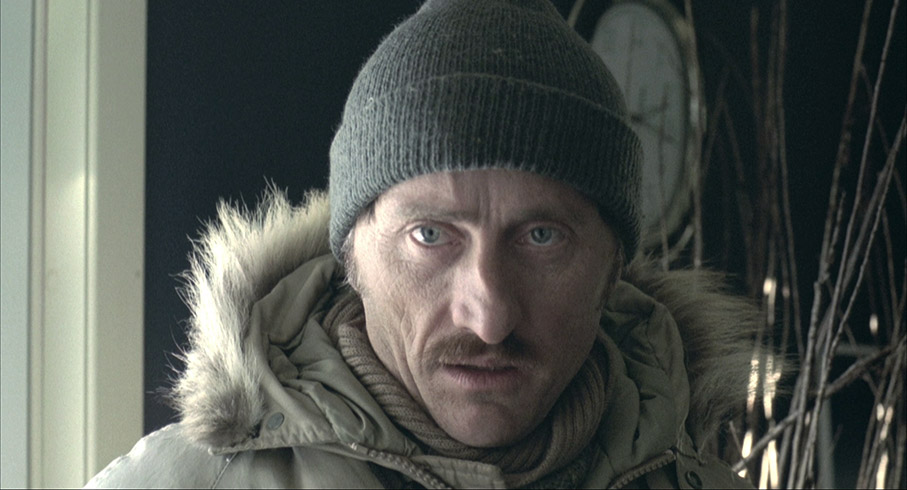
Where Curling really deviates from any number of minimalist character dramas is through the introduction of plot twists that in most films would be there to kick off the main story, but here become tools with which to delve into what makes Jean-François and Julyvonne tick. This does result in mysteries being set up that are never explored or solved, presumably because to do so would not be relevant to how they impact specifically on the two individuals around whom the film revolves. And if it seems as though I'm dodging around specifics here, it's because I'm sure these moments are going to be more effective if experienced unprepared. What intrigues about them (and while I'm going to avoid specific spoilers, I may end up dropping hints to the nature of these twists, so feel free to hop ahead to the next paragraph) is the way in which they may or may not be connected. There is a subtle suggestion that an alarming discovery by Jean-François in a motel room (one that gives rise to a moment of almost Kaurismäki-style black humour) may be linked to something that Julyvonne stumbles across later, while both might just have something to with a vehicle that stops just up the road from the Sauvageau household, one the lonely Julyvonne observes in a manner that underlines her yearning for an unexpected visitor. Something Jean-François later comes across while driving, meanwhile, links back to an earlier encounter outside of his house, and his subsequent actions serve to show just how far he is prepared to go to protect the security of his small family unit. Adding an inconclusive footnote to these events is a later sequence in which police cars stream urgently past the Sauvageau home, their purpose and destination never confirmed. Could it be connected to either of the secrets being harboured by Jean-François or Julyvonne, or is it something completely unrelated? Having watched the film twice I still couldn't say for sure.
That the situation will evolve around Jean-François seems likely from an early stage for the simple reason that he is one who most obviously needs to face up to the effect his restrictions are having on his daughter (and in an intriguing touch, Julyvonne is played by Philomène Bilodeau, the real-life daughter of actor Emmanuel Bilodeau, who plays Jean-François). Quite what form that evolution will take is never certain, with morally problematic decisions made by Jean-François having the potential to seriously impact on him and Julyvonne, whose unspoken loneliness and fascination with her own dark secret could have its own possibly (self-) destructive consequences. That the film ends in a manner that logic dictates it should does no harm to a work which rarely takes the predicted path and frankly feels absolutely right for the characters, right down to the symbolism of Jean-François' facial hair. It leaves a whole slew of questions deliberately unanswered, but for me still proved a satisfying conclusion to a quietly captivating and intelligently made film.
So used am I now to seeing transfers taken from digitally shot originals that I actually got a little bit excited by the very rare dust spots that put in an appearance, as this told me that Curling was shot on film, and in his interview on this disc Côté confirmed it was his first 35mm feature. The transfer itself is a strong one, with very nicely balance contrast, sharply rendered detail and naturalistic colour, which makes the inevitable shift to slightly warmer tones on some night-time interiors. Occasionally the image does soften but this appears to be the result of the camera focus being was just a tad off in situations where the depth-of-field was no more than a few millimetres. The framing is the widescreen cinema standard of 1.85:1 and a fine film grain is visible.
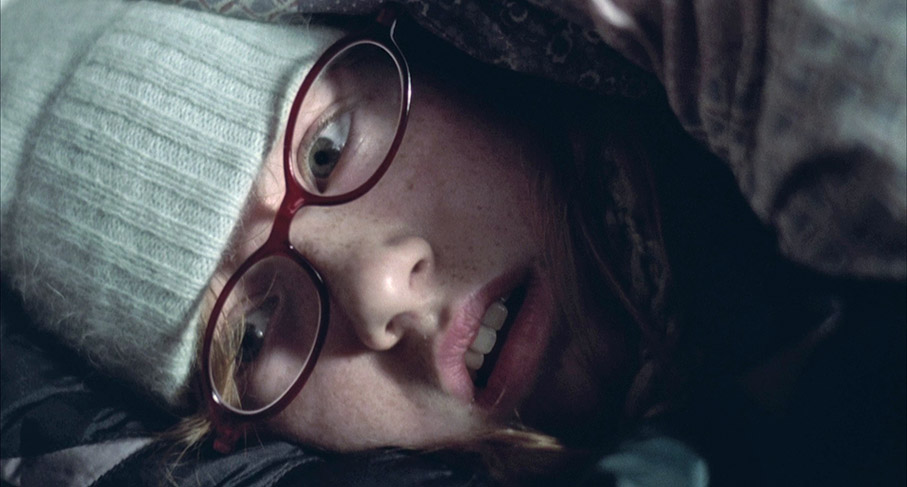
Two soundtrack options are available, DTS-HD Master Audio 5.1 surround and Linear PCM 2.0 stereo. I'll cut to the chase here and say up front that the 5.1 track is the way to go, having a fuller sound with punchier bass, a better spread of sound and cleaner reproduction of the dialogue, some of which has a coarser feel on the stereo track. Silence is well used here but when the effects make their mark – the wind in the second shot is a fine example – they sound great on the 5.1.
The optional English subtitles kick in by default but can be switched off if your French is good enough.
Interview with director Denis Côté (25:04)
A useful interview with director Denis Côté, who is more forthcoming here about his thinking behind the film and its narrative and characters than I somehow expected him to be. He recalls his early days gorging on horror cinema and how seeing all of the films on his college's must-watch list set him on the road to becoming a filmmaker. He briefly talks about his early short films and his first feature before getting on to the specifics of Curling, his original idea for the film and the themes he wanted to address, and the idea that this was planned as a more audience-friendly film than his short films tended to be. He discusses the casting of Emmanuel Bilodeau's daughter Philomène in the role of Julyvonne and reveals that her father was almost as protective of her as his character is of his daughter in the film. Few will be surprised that he doesn't like films that provide the audience with all of the answers, and he admits that as a result there are plot holes in Curling, something the film has been both praised and attacked for. He also talks about the Quebec-based film movement of 'suicidal realism', a term with which I must admit I was not previously familiar.
May We Sleep Soundly [Que nous nous assoupissions] (14:11)
An experimental short film from 2015 directed by Denis Côté that is bonded to Curling only by its director, its snow-covered landscape and its minimalist approach. It's shot entirely from the point-of-view of an unidentified figure, who enters several houses in which all of the occupants are sound asleep, despite it being daylight, most of them in bed but some on sofas and chairs and even on the floor. Nothing is explained and we're left to provide our own interpretation and decide whether what we've come up with actually matters. Cleanly shot on digital, with sound effects of footsteps rendered loud enough to suggest that those being observed are not just taking a quick nap.
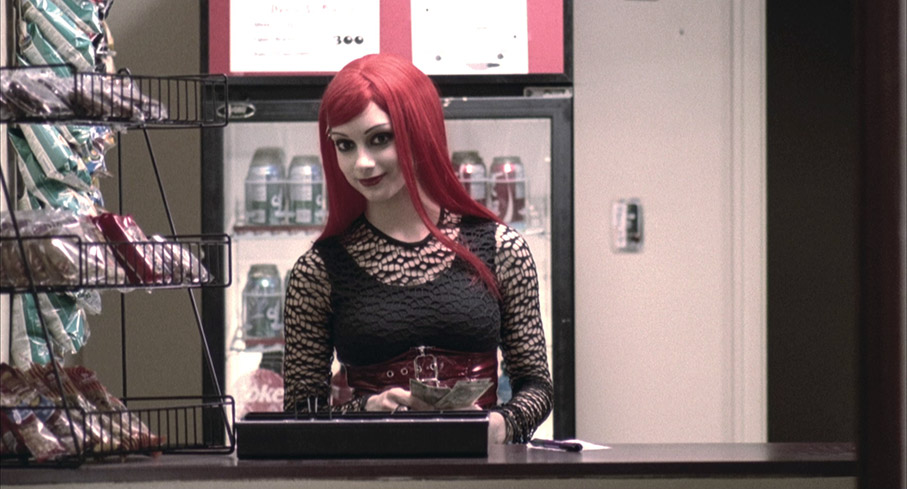
Booklet
The typically cleanly laid-out Second Run booklet includes two knowledgeable and interesting essays on the cinema of Denis Côté. In the first, film critic Adam Nayman examines his feature work up to Curling on a film-by-film basis and reveals just enough about each to make me want to see them without dropping too many spoilers. The second, by Tom McSorley, Executive director of the Canadian Film institute in Ottawa, goes into slightly more analytical detail and while this is just as engrossing as the previous essay, I found myself skipping over a couple of bits to avoid having plot points revealed in advance of seeing the films themselves.
Another of those 'definitely not for everyone' films we tend to favour at Outsider, Curling was my first exposure to the work of Canadian filmmaker Denis Côté and one that, in its own distinctive and low-key way, made quite an impression. Some will definitely be irritated by its inconclusive elements and an ending that points in a direction that, while full of possibilities, is left to us and our imaginations to follow. Personally I appreciate being asked to work a little instead of taking a purely passive role, and the film lays all the groundwork you need to draw your own conclusions. It's an unexpected release from Second Run, but a welcome one, and the presentation is well up to the label's usual high standards. Recommended.
|